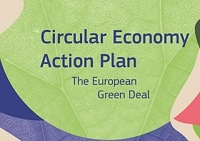Petrochemicals Crude Oil Biofilm 21-03-2020 - Arhive
Petrochemicals Crude Oil Biofilm
-Clariant and Floreon enter high-performance biopolymer collaboration
Clariant’s Additives business and UK-based Floreon-Transforming Packaging Limited have announced a collaboration to extend the performance properties and market potential of biopolymers, whilst preserving their environmental benefits.
The collaboration aims to access additional possibilities for plastic manufacturers and brand-owners to consider biopolymers as a viable, low-carbon footprint alternative to fossil-based plastics for both single-use and durable applications.

-Different approach to safe plastics recycling needed: EUBP
European Bioplastics (EUBP) has offered its broad support to the European Commission’s (EC’s) new Circular Economy Action Plan (nCEAP), but has voiced concerns over measures around the safe recycling of plastics. Petrochemicals Crude Oil Biofilm
EUBP said the nCEAP was an “ambitious step forward to transform Europe into a circular economy”, but added it would prefer a different approach to ongoing and planned initiatives for plastics – notably, those used in packaging.

With the shared goal of making a more sustainable future happen today, Coca-Cola Beverages Philippines, Inc. (CCBPI)—the bottling arm of Coca-Cola in the country—and Thailand-headquartered Indorama Ventures have signed a joint-venture agreement to establish PETValue, the largest state-of-the-art, a bottle-to-bottle recycling facility in the Philippines. Petrochemicals Crude Oil Biofilm

-Avantium interview: How can the chemicals industry be more sustainable?
We’ve heard polyethylene furanoate described by some as the ‘polyester of the future’, and chemicals company Avantium is very much championing its environmental benefits. Victoria Hattersley spoke to CEO Tom Van Aken about why this is, and the conversation led on to the specific challenges faced by the chemical industry when it comes to adopting more sustainable production models. Petrochemicals Crude Oil Biofilm
VH: Can you tell me about Avantium’s plants-to-plastics technologies, and the development of PEF as a potential alternative to conventional plastics? What are the unique properties of this material from an environmental standpoint?

-Ulma packaging welcomes government plans for plastics tax
Ulma Packaging UK has welcomed measures put forward by government to tax plastic packaging that is less than 30% recyclable.
As the company noted, the sector is continually moving toward a more circular economy in plastics, and it believed the latest British legislation will help drive innovation and achieve that goal to deliver tangible positive environmental impacts.
With companies using plastic packaging containing less than 30 per cent recycled content set to be taxed £200 per tonne from April 2022, Ulma added that plastic packaging machinery manufacturers are well-positioned to take the lead in prescribing eco-friendly solutions. Petrochemicals Crude Oil Biofilm

-Indorama Ventures will complete expansion of TPA and PET production in the USA in 2023
The Thai company Indorama Ventures Ltd (IVL) has announced that its joint venture for the production of purified terephthalic acid (TPA) and polyethylene terephthalate (PET) in Corpus Christi in the United States will be completed in 2023, the company said. .
PET manufacturers DAK Americas, IVL, and Eastern New Century (FENC) completed the acquisition of a PET plant from M&G USA Corp through a Corpus Christi Polymers joint venture in December 2018. Petrochemicals Crude Oil Biofilm

-European recycling markets reel from coronavirus
Concerns over the long-term impact of the coronavirus outbreak on key European recycling markets sharply escalated this week following the adoption of further containment measures across the continent. Petrochemicals Crude Oil Biofilm
Sources are particularly worried about limited volumes entering collection systems, logistic disruptions, potential downstream demand losses in non-packaging sectors, buyers abandoning sustainability measures and a reduction in necessary long-term investment.

-US Q2 GDP plunge may reach 8%, crushing chem demand
The US economy could contract by 8% in the second quarter as a result of the disruptions caused by the coronavirus (Covid-19) and the decline in oil prices, the chief economist of the American Chemistry Council (ACC) said in an ICIS webinar on Thursday.
Such a sharp decline in GDP would slow down several petrochemical end markets. ICIS editors highlighted how a downturn could affect major plastics and chemicals, part of a free webinar series ICIS will run through next week. Petrochemicals Crude Oil Biofilm
EFFECTS ON THE GENERAL ECONOMY
The coronavirus started off as a supply shock and is now becoming a demand shock, said Kevin Swift, ACC chief economist. He made his comments during the ICIS webinar, “The Impact of Coronavirus on Chemical and Energy Supply Chains”.

-MEG prices fall in Asia by 6.08%
Monoethylene glycol (MEG) prices in Asia fell 6.08% on Thursday amid a sharp drop in oil prices and futures in China, ICIS reports. Petrochemicals Crude Oil Biofilm
MEG spot prices fell to USD414-420 per tonne, CFR CMP, which is USD24-30 per tonne lower than the previous day. Monoethylene Glycol MEG Prices
According to market sources, several shipping transactions in the second half of March-April were concluded at a price of USD410-420 per tonne, CFR CMP.

-Lenzing publishes latest Sustainability Report
Just ahead of the ‘Day of Forests’ on 21 March, which the FAO (Food and Agricultural Organization of the United Nations) introduced in the 1970s in response to global deforestation, the Lenzing Group has published its Sustainability Report 2019. This sets out how the company is actively dealing with the global challenges.
Lenzing produces fibres from the renewable raw material wood and is well known among its customers and partners in the global textile and nonwoven fabric industry for the clear position it takes as a sustainable producer. It is no accident that the new report is appearing on the International Day of Forests. Lenzing’s sustainable practices in procurement, especially for wood and pulp, were once again ranked as leading in the 2019 reporting year (Hot Button Report). Petrochemicals Crude Oil Biofilm

Petrochemicals Crude Oil Biofilm
